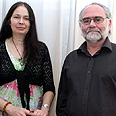
Drinking tea with the man who killed my father
Her father was killed in an IRA bombing but Jo Berry decided to meet the men responsible; her first meeting with Pat Magee, the bomber, developed into a public dialogue lasting years; the two visited Israel and told Ynet their story
He chooses his words with great care, restraint and focus. Perhaps these are the same qualities that served him when he planted a bomb in a hotel in Brighton, England, killing five people.
Related stories:
- Irish host censured for Israel 'cancer' slur
- 'Ireland most hostile country in Europe'
- Minister Braverman: Seek Arabs' forgiveness
Not far from him sits Jo Berry. Delicately featured, her voice is soft but confident. Her father, Sir Anthony Berry, was killed in the bombing.
For the past 12 years Berry and Magee have been conducting a personal and a public dialogue on issues of reconciliation, violence, forgiveness and understanding.
This week the two visited Israel and the Palestinian Authority, and told Ynet their story.
In October 12, 1984, before sunrise, a bomb exploded in the Brighton Grand Hotel where a Conservative Party conference was being held.
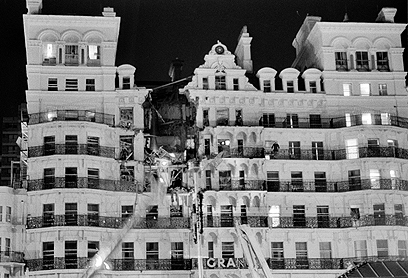
Brighton Grand Hotel after the bombing (Photo: Gettimages)
Five were killed – two politicians and three politicians' wives. Dozens were injured.
Among the victims was MP Sir Anthony Berry. The Brighton Bombing, part of The Troubles, the armed conflict for Northern Ireland's independence, was an attempt on the life of Prime Minister Margaret Thatcher, who was unscathed, leading the conference as planned the following day.
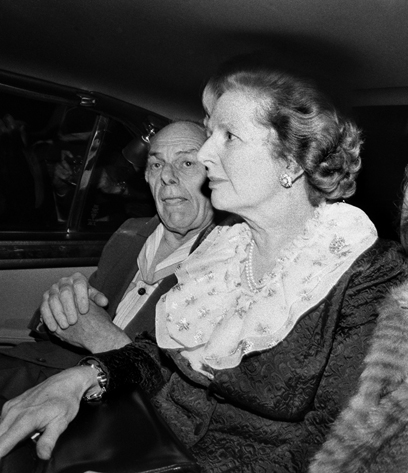
Margaret Thatcher (Photo: Gettyimages)
The Irish Republican Army (IRA) took responsibility for the attack. A police investigation found that Magee, 35 at the time, took a room in the hotel a few weeks prior to the attack under an assumed name, planted the bomb in a bathtub in room 629 and activated it by remote when the conference was held.
Magee was caught several months later and in 1986 was sentenced to eight life sentences for the bombing and for other activities, the judge describing him as "a man of exceptional cruelty and inhumanity."
But the judge's opinion did not deter Jo Berry.
"Two days after the bombing I went somewhere very special in London and I made a personal commitment – I will find a way to bring something positive of what has happened and I'll try and understand those who killed my father," Berry said this week in a meeting in Tel Aviv with the Palestinian Israeli Bereaved Families for Peace Organization (PIBFP), which conducts meetings between Israelis and Palestinians who lost family members to the conflict.
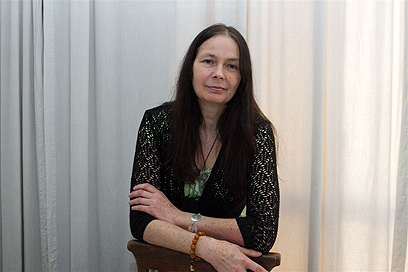
Jo Berry (Photo: Ofer Amram)
Jo, 27 at the time of her father's death, visited Belfast, the scene of pitched battles between Irish Catholic "Republicans," who wanted to overthrow British rule and join Ireland, and Protestants loyal to the British crown.
While British soldiers and tanks roamed Belfast's streets Berry met with bereaved families from both sides and with top members of the IRA.
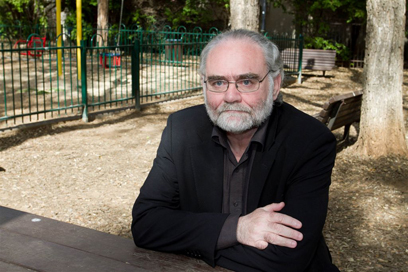
Patrick Magee (Photo: Ofer Amram)
In 1998 the Good Friday Agreement was signed, which paved the way for a ceasefire and recognition of the nationalist demands of both sides in the warring state.
The agreement also brought about the release of Pat Magee after 14 years in prison.
"My first thought was 'It's okay for him now he's free, but my dad can never come back," Jo recounted.
"And then I thought – we have peace, and that is a positive thing to happen."
Not long afterwards the two met for the first time. On November 24, 2000, 17 months after his release, Pat was ready to lay down before Jo his political ideologies and his justification for the bombing.
But, he recounted, as he was standing at the door, "suddenly the whole enormity of what I was about to do hit me."
On the other side of the door Jo waited for that knock. "When Pat walked in I shook his hand and thanked him for coming and he said 'no no, thank you'".
At first Pat talked. He told Jo of his decision to join the IRA and about violence as a legitimate political strategy, justifying the killing of her father.
"I offered some explanation of the thinking behind the bombings in England," Pat remembered.
"While I was talking I was also watching her. I was very conscious of how attentive she was to what I was saying. I was puzzled, and I found the whole experience disarming."
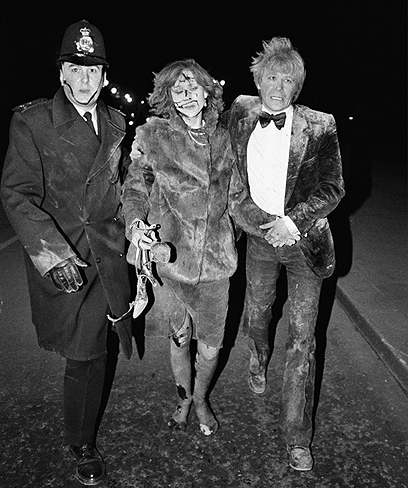
Wounded evacuated from the Brighton bombing (Photo: Gettyimages)
Jo listened. "But then something happened. Pat stopped talking, he rubbed his eyes and he said: 'I don't know who I am anymore. I want to hear your rage and your pain, and how can I help you.' And then the conversation and the dialogue were very different."
This was what Jo has been aiming for. The personal, human moment.
If she had been more aggressive and argued with him, Pat said, he would have just sufficed with the political explanation and left. But being actually listened to made him speechless.
But Jo did not only listen. She also told Pat of her father. "Before he left he told me: 'I'm very sorry I killed your father," she remembered.
The two described how confused they both were after that initial meeting. But the confusion did not stand in the way of their convicton in the necessity of the talks, realizing they are at the beginning of a journey for self inquiry.
A cup of tea
Their care for each other is evident. Even when the strain shows on their faces, even when they describe a hard talk the previous evening in a restaurant in Jerusalem's old city, Jo tenderly asks Pat if he enjoyed his lunch. Pat reminds her with gentleness of something she forgot.
It seems that since the first moment they saw each other as human beings, and against all odds, Jo and Pat have perfected the ability to view the other in a complex and human way.
After the first meeting and in light of a decision to conduct further talks and document them for the BBC, Jo decided to tell her three daughters of her plans.
He seven-year-old daughter inadvertently penetrated the root of the conflict when she asked Jo to ask Pat if he did not see "Grandpa Tony" when he planted the bomb.
When she asked Pat, he answered "No." He saw no people there. It was only through his daughter that Pat came to recognize Anthony Berry as a human being.
"Over the course of many meetings a picture built up in my mind of Jo's father. Before he had been like a zero. Now I began to understand this man better," he described.
"I realized that the qualities that I admired in Jo must have come in some measure from her father. And I killed this man."
Pat explained the process he underwent in the course of the meetings. "Something had happened to me that I didn't think would happen. We had all accused our political enemies of misrepresenting us, of demonizing our struggle and us.
"Suddenly I was in the presence of someone who was really trying to listen. And I think it was at that moment, although I may not have had the words to explain it, that I too, and people like me, were also acting under a reduced view of our enemies."
Jo told how her daughter, ahead of the next meeting, asked her whether Pat really said he was sorry. When she answered positively, she said, her daughter asked her to tell him to make her grandpa come back.
The filming, which started as a private enterprise, became a documentary film which forced Pat and Jo to reveal the secret meetings to their relatives. Though Jo's family was supportive, they did not meet Pat themselves.
The two began holding public meetings and in 2009, marking the 25th anniversary of the bombing, they talked before the British Parliament.
"When we did our first talk in London Pat said at the talk that he now knew that he could sit down with my dad and have a cup of tea," Jo said.
"How much better it would have been if the cup of tea had been there as a possibility before violence was used," she added.
The silenced voice
I met with Jo and Pat at the home of Robi Damelin, a PIBFP activist who lost her son David in 2002, during the second intifada.
A Palestinian sniper, Ta'ar Hamed, shot him while he was guarding a road block in the West Bank.
Hamed killed eight soldiers and two civilians and escaped. He was caught two years later and sentenced to 11 life sentences.
Robi, a spritely and quick-tongued woman from South Africa, is inspired by Jo and Pat's story.
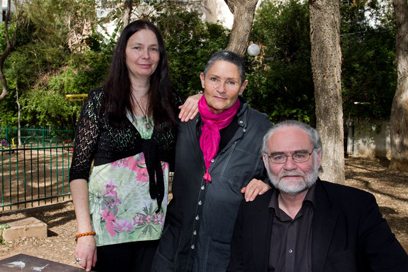
Pat, Robi and Jo (Photo: Ofer Amram)
She wrote Hamed a letter and intends to meet with him. Though his first response was demonstratively political, without a personal tone and with no avenue for reconciliation, he recently agreed to meet with her.
Robi sees the similarities between her story and Jo and Pat's. When they told how they receive the harshest responses from Northern Ireland, she sympathized – in Israel she is ofter called a "traitor."
It is clear the three share a deep understanding. But I try and understand why, beyond the personal journey, they believe there is a need for national processes of reconciliation, and whether it is impossible to make do with a political solution, a peace treaty. Is it even possible to discuss reconciliation while the conflict is still going on?
"I don't think that you can have a political solution here without a reconciliation process," Robi insisted.
"You certainly can have a ceasefire, that's true. But if there's no reconciliation between the people it'll just be until next time."
Pat agreed: "That's exactly what happened at home. You suddenly had an end to the armed conflict and then started the process of reconstruction and reconciliation. I think it should have begun before that. There should have been more emphasis on that. It's about being heard versus the exclusion, excluding people's voices."
Forgiveness
Jo and Pat describe their own process as a "journey," but even after 12 years of dialogue and joint activity the road is not without obstacles.
Pat explains they are still divided on an array of issues, but these do not harm the trust they now have which enables their talks.
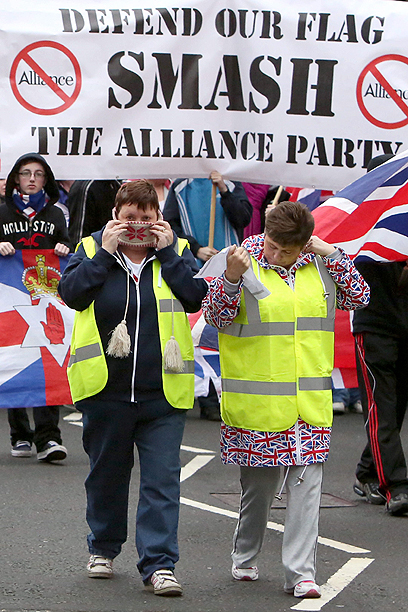
Loyalist march in Belfast, January (Photo: EPA)
When asked whether in addition to his remorse he also regrets his actions, whether he believes his country would have won self rule without armed struggle, Pat's answer is long and calculated.
"I've expressed a personal regret to the victim of my actions. I also feel enormous regret for having been involved in a struggle that killed people,. You don't want to be someone my age and looking back and knowing you've hurt people and you've killed people.
"But I've found myself in a situation of conflict, I played a role in that. I thought there were no other options to our communities but to engage in that armed struggle – but I regret it – but I thought it was necessary. It's a conflict here and here (gesturing to demonstrate his mind and heart) and it's perhaps irresolvable.
" There's no squaring that circle. I'm deeply conflicted about the past, would rather it had been different, but in the context I saw no other options. I don't think we would where we are today, in terms of the peace process, in terms of shared administration if we haven't come through conflict. That's my personal belief."
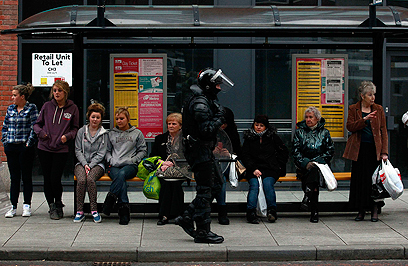
Police security in Belfast bus stop (Photo: Reuters)
"I think that if you've hurt or killed somebody, caused suffering, you have got to regret that. And especially when we're talking about decades of conflict. Whole lives were taken up in that conflict, many people's lives were. And it's not the life we would have wished for.
"When I was 18 I thought of other things, I went briefly to art school, I toyed with the idea of being an artist for example. But suddenly you're caught up in this context of violence and you see other people around you responding to it and it's as if you feel an obligation to stand shoulder to shoulder with the people who are being bullied. Walking away from it – I found it impossible."
While Pat is struggling with his past, Jo is dealing with her own personal issue of forgiveness.
"When Pat shared with me a lot of the difficult times he experienced as a young lad and I listened deeply, and I realized that if I had been born to his life I may have made the same choices.
"But in that moment of empathy, there is nothing to forgive, there is just that understanding.
"When people asked me had I forgiven Pat there really isn't any simple answer because people mean so many different things when they talk about forgiveness. Does forgiving mean giving up my right to be angry? No. I want to keep this right. So I talk of understanding.
"I've reached a place within me where I can think that maybe, had I been n Pat's shoes and experienced what he had experienced, I would reach the same conclusions as he has. Maybe. And that's a major thing. For me, that understanding is more important than forgiveness".
Robi pitched in with her own definition of forgiveness: "Forgiving is giving up your just right for revenge."
- Receive Ynetnews updates directly to your desktop











